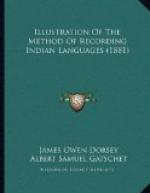g[e]ka|shualk[o]ltchuk|p[e]niak|[k=][=o]&rsq
uo;[k=]s|p[e]pe-udshak| they | (and) to cool | without | dress | only to go | leave | themselves off bathing
|[e]wagatat,|[k=][o][k=]etat,|[e]-ush |in a spring,| river, | lake
wig[a]ta.|Spukli-u[a]pka|m[=a]’ntch.| Shp[o]tuok |i-ak[e]wa| close by. |They will sweat| for long |To make them-| they bend| hours. selves strong down
| k[a]pka, |sk[^u]’tawia |young pine-| (they) tie trees together
sha |w[e]wakag|kn[^u]’kstga.|Ndshi[e]tchatka|kn[^u]’ks a|sha | they| small | with ropes. |Of (willow-)bark| the ropes |they| brushwood
|sh[u]shata. 12 | make.
G[a]tpamp[)e]lank|shkoshk[^i]’l[x]a|kt[a]k
tiag|h[^u]’shkankok| On going home |they heap up into| small |in remembrance| cairns stones
|[k=][)e]lek[a]pkash,|kt[a]-i | of the dead, | stones
sh[u]shuankaptcha|[^i]’hiank.
of equal size |selecting.
NOTES.
No Klamath or Modoc sweat-lodge can be properly called a sweat-house, as is the custom throughout the West. One kind of these lodges, intended for the use of mourners only, are solid structures, almost underground; three of them are now in existence, all believed to be the gift of the principal national deity. Sudatories of the other kind are found near every Indian lodge, and consist of a few willow-rods stuck into the ground, both ends being bent over. The process gone through while sweating is the same in both kinds of lodges, with the only difference as to time. The ceremonies mentioned 4-13. all refer to sweating in the mourners’ sweat-lodges. The sudatories of the Oregonians have no analogy with the estufas of the Pueblo Indians of New Mexico, as far as their construction is concerned.
586, 1. l[a]pa sp[^u]’klish, two sweat-lodges, stands for two _kinds_ of sweat-lodges.
586, 5. shash[a]moks=l[o]latko forms one compound word: one who, or: those who have lost relatives by death; cf. pt[i]sh=l[^u]lsh, pg[i]sh=l[^u]lsh; hishu[a]kga pt[i]sh=l[u]latk, male orphan whose father has died. In the same manner, [k=][)e]lek[a]tko stands here as a participle referring simultaneously to h[i]shuaksh and to sn[a]wedsh w[e]nuitk, and can be rendered by “_bereaved_”. Shash[a]moks, distr. form of sh[a]-amoks, is often pronounced shesh[a]maks. T[u]mi etc. means, that many others accompany to the sweat-lodge, into which about six persons can crowd themselves, bereaved husbands, wives or parents, because the deceased were related to them.




